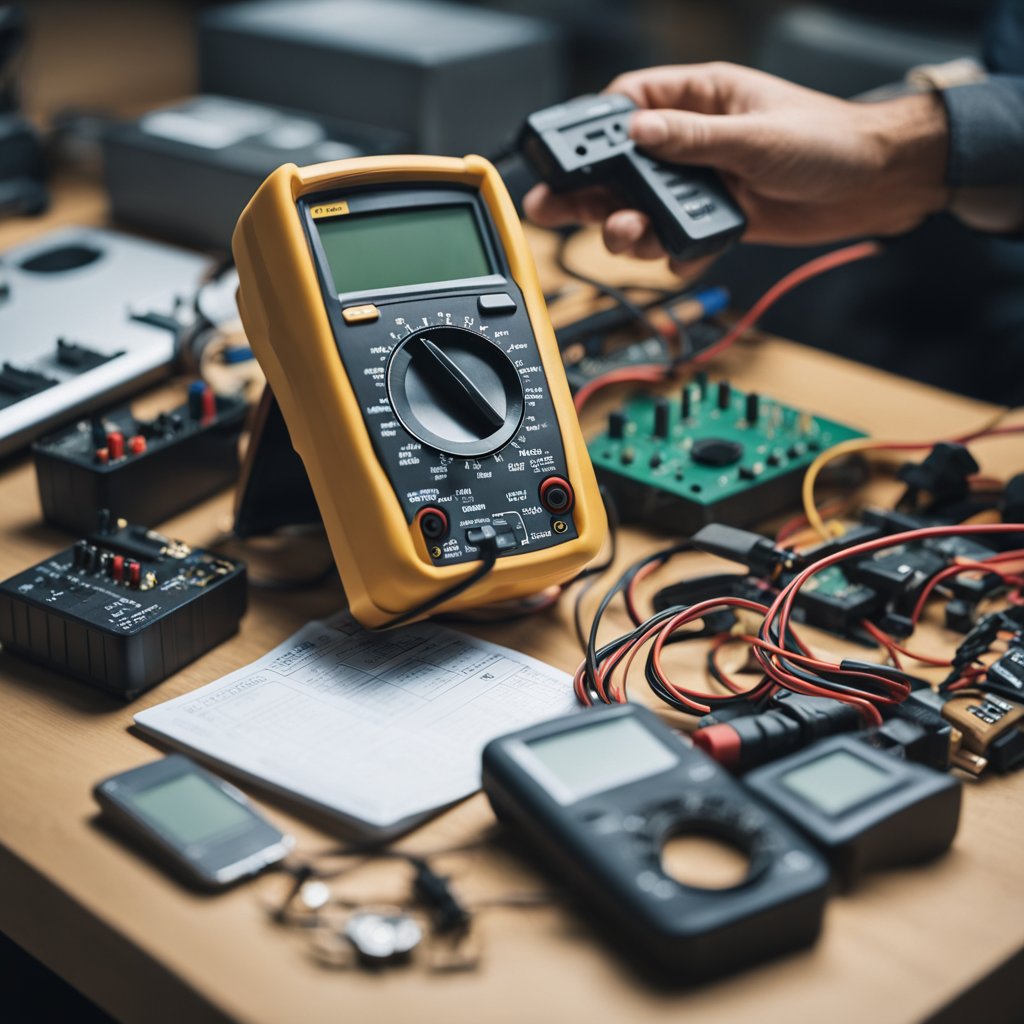For anyone involved in electrical systems, a multimeter is more than simply a tool; it is an essential part that guarantees the efficiency and security of electrical projects. Its precise resistance, voltage, and current measurements simplify troubleshooting and enhance testing accuracy.
When selecting the best multimeters for electrical testing, it’s vital to consider features like ease of use, accuracy, durability, and additional functions. These features are crucial because they determine the efficiency and reliability of the multimeter in your electrical projects. Equally significant is the multimeter’s ability to evolve with the increasing complexity of your projects. The design, display readability, and safety ratings are also crucial. A good choice should not only meet your current needs but also be adaptable to the growing complexity of your projects.
We scoured the market for reliable and efficient multimeters and compiled a list of the best. This research presents the best options, empowering you to make informed decisions about your electrical testing needs. Our thorough evaluation will assist you in selecting the best multimeter for your specific requirements. Click here for further information on our site, Ice Age Tools.
Best Multimeters For Electrical Testing
We have researched and compiled a list of the best multimeters for electrical testing. These tools are essential for accurately measuring voltage, current, and resistance in various electrical projects. Our selection offers reliable options to help both beginners and experienced users.
Klein Tools Multimeter Test Kit
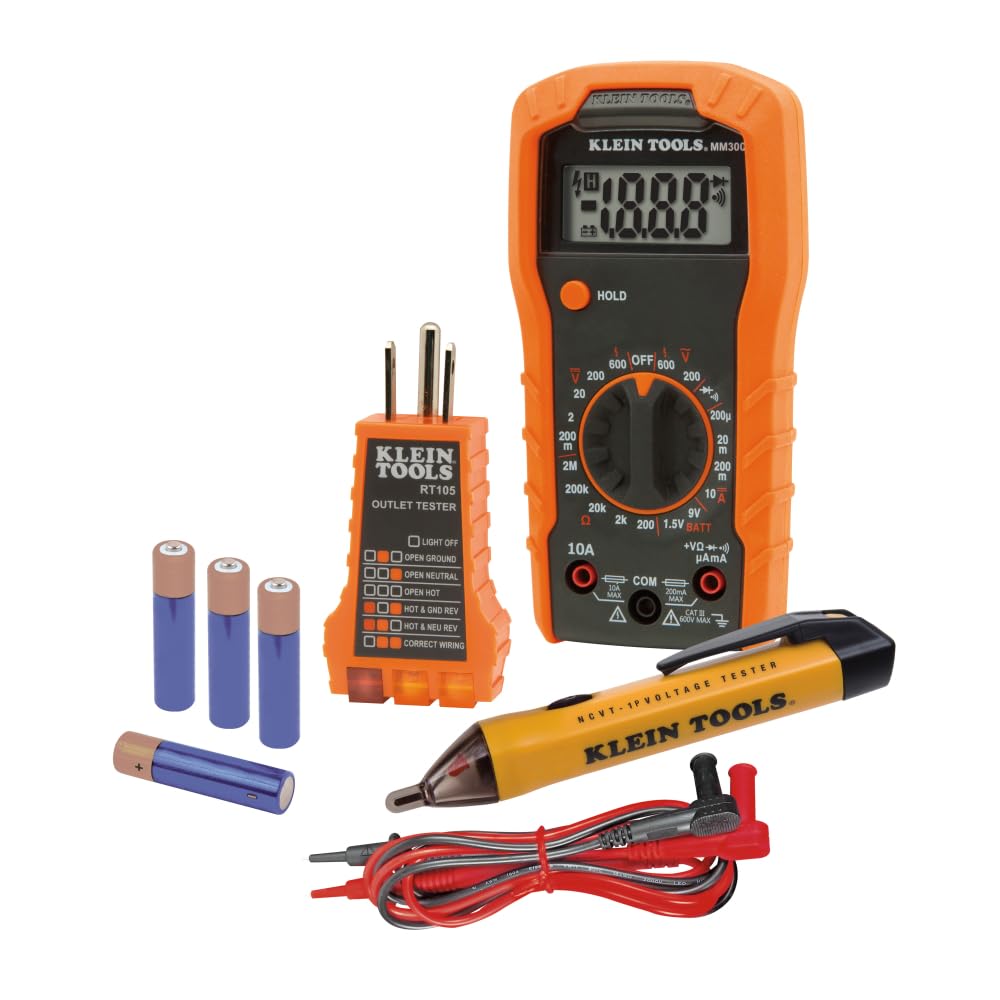
The Klein Tools Multimeter Test Kit, a versatile and reliable option, is designed to cater to various electrical testing needs. Its adaptability and convenience make it a confident choice for any project, ensuring a smooth and efficient testing process.
Pros
- Easy to use with clear indicators for readings.
- It is compact and includes essential tools for home electrical tasks.
- Designed to withstand harsh conditions for several years to come.
Cons
- The multimeter doesn’t measure capacitance, which some users may need.
- The outlet tester will need to be substituted by specific sockets used globally.
- Some users found the instructions needed more detail.
The Klein Tools Multimeter Test Kit provides a solid range of features for electrical testing. We found it especially handy for home projects. The MM300 multimeter offers an easy way to measure voltage and resistance. Its manual-ranging feature helps you get accurate readings without confusion.
Using the NCVT1P Non-Contact Voltage Tester, we felt confident detecting live wires. The bright LEDs and audible alerts made it straightforward. We appreciated how safely we could check voltage levels without direct contact.
The RT105 Receptacle Tester rounded out the kit. It quickly indicated wiring issues in standard outlets. Doing electrical work is easier when you have reliable tools. This kit gives us a comprehensive set for tackling common problems.
Klein Tools MM325 Multimeter
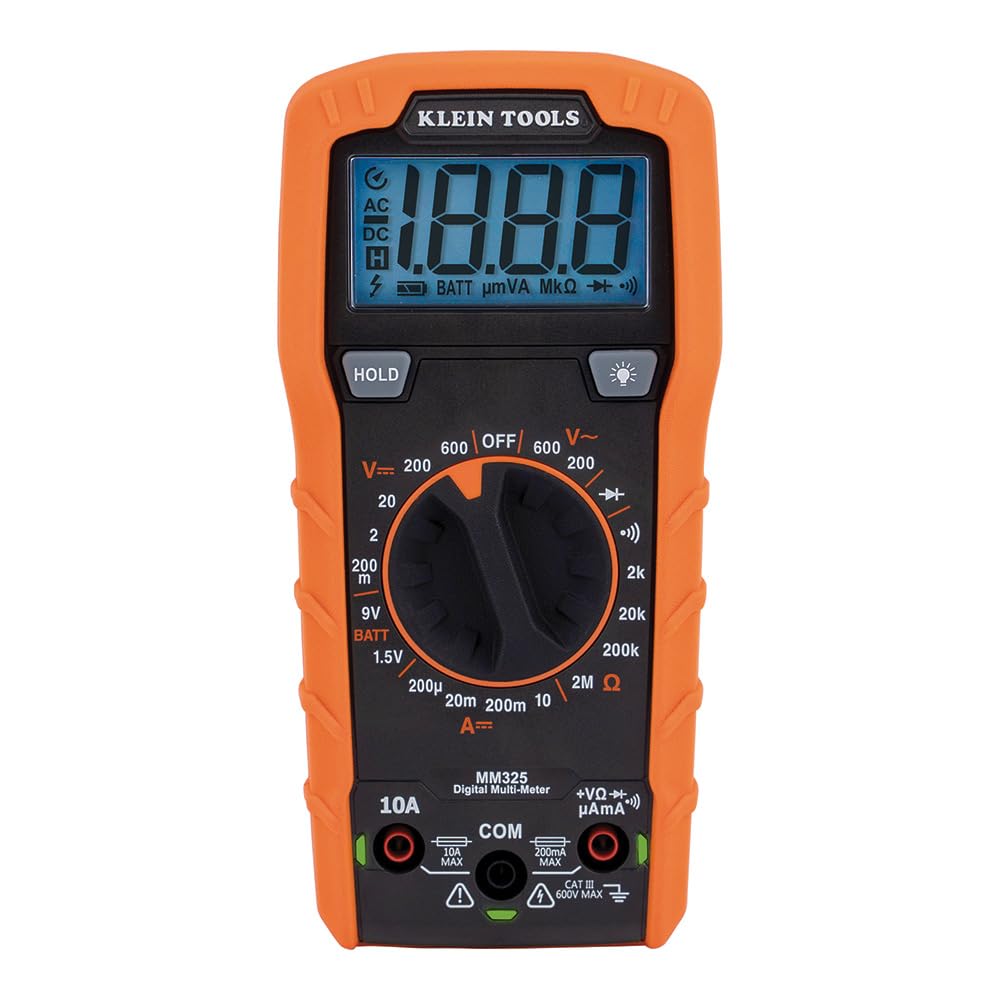
The Klein Tools MM325 is a reliable multimeter that combines functionality with a user-friendly design. Its clear instructions and intuitive layout ensure a straightforward electrical testing experience, making it a great option that offers a comfortable and pleasant experience for users of all skill levels.
Pros
- Sturdy design; withstands minor drops and rough handling.
- Clear, backlit display, great for low-light situations.
- Versatile testing options, including voltage, resistance, and battery checks.
Cons
- Manual ranging may only suit some people’s preferences.
- Some users need accessories on delivery.
- It’s slightly bulkier than some other compact models.
We recently tested the Klein Tools MM325 multimeter. Its sturdy build made it easy to handle, even in tight places. The clear, backlit display stood out and proved helpful in a less-than-ideal lighting situation.
Testing batteries was a breeze. The battery test mode is a fantastic feature that lets us quickly check various battery types. The user-friendly layout and large screen numbers made readings easy to understand.
While some might prefer an auto-ranging model, we enjoyed the manual range. It felt more controlled, especially when dealing with higher voltage levels. Plus, with its additional features like diode testing and continuity checks, Klein Tools knows what professionals need.
Klein Tools MM320KIT
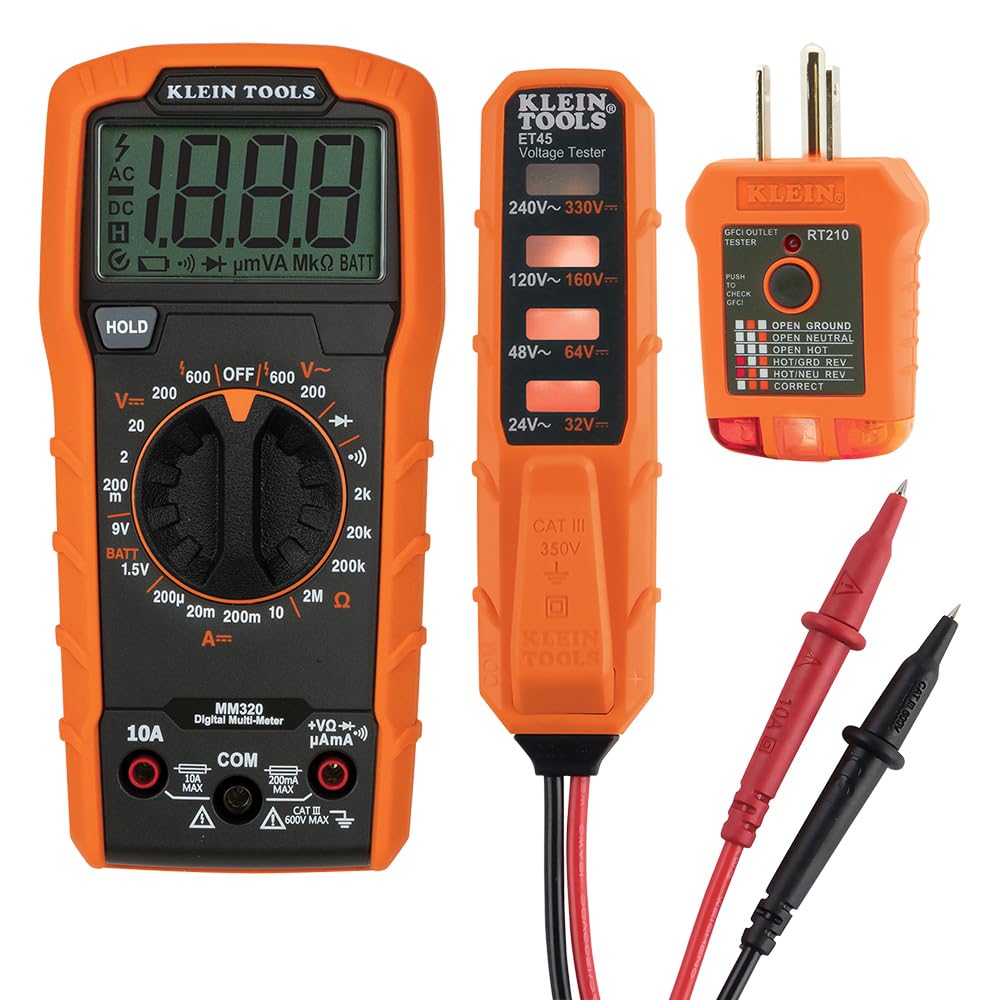
This multimeter kit is a solid choice for anyone needing reliable electrical testing tools.
Pros
- Several testers meet different requirements.
- The built-in flashlight offers convenience in dim conditions.
- Durable and well-made, reflecting Klein’s quality.
Cons
- It may feel overwhelming for beginners due to many tools.
- Weight can be too much to carry daily.
- Extra battery components, some of which may not be required.
Using the Klein Tools MM320KIT has made our electrical jobs much more accessible. The digital multimeter provides precise readings for voltage and current, which is essential for troubleshooting. The additional tools in this kit, like the non-contact voltage tester, make checking different electrical points simple and quick.
We appreciate the voltage tester’s flashlight feature. It lights up dark areas and is handy when working in tight or poorly lit rooms. Additionally, the build quality gives us confidence that this kit will last through daily use.
The Klein Tools MM320KIT is a comprehensive multimeter kit that meets various electrical testing needs. From home projects to professional tasks, this kit equips you with the necessary tools, ensuring you feel fully prepared and equipped for any task.
Fluke 115 Multimeter
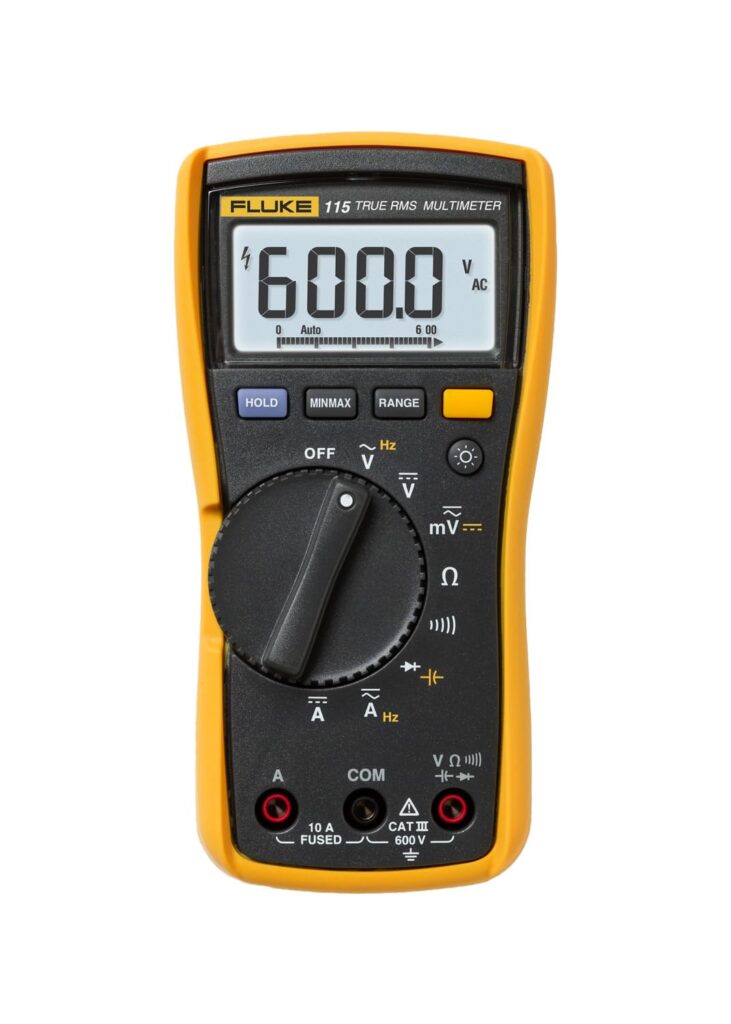
We highly recommend the Fluke 115 for anyone needing a reliable, portable multimeter for various electrical testing tasks.
Pros
- Because of its small size, it is convenient to transport.
- Accurate readings with true-RMS measurement.
- A User-friendly interface ensures quick usage.
Cons
- Some users may find the display contrast lacking.
- Additional accessories need to be purchased separately.
- It is not suitable for extremely high voltage settings.
Using the Fluke 115 made our electrical testing tasks much more straightforward. It feels well-built and comfortable to hold. We appreciate the compact size, perfect for on-site work and home use. The true-RMS readings have proven to be very accurate, which gives us confidence in our measurements.
The large LED backlight is functional when working in dim environments. We found it easy to navigate the buttons and dials, making it straightforward to switch between functions. The auto-ranging feature also takes away some of the guesswork, alerting us to any errors while measuring.
We’ve encountered minor drawbacks, though. The display can be complex to read in certain lighting conditions, which might frustrate some users. Additionally, while it includes essential accessories, we wish it had all the necessary components. Overall, if you’re looking for a robust and reliable multimeter, the Fluke 115 is an excellent choice.
Fluke 17B+ Digital Multimeter
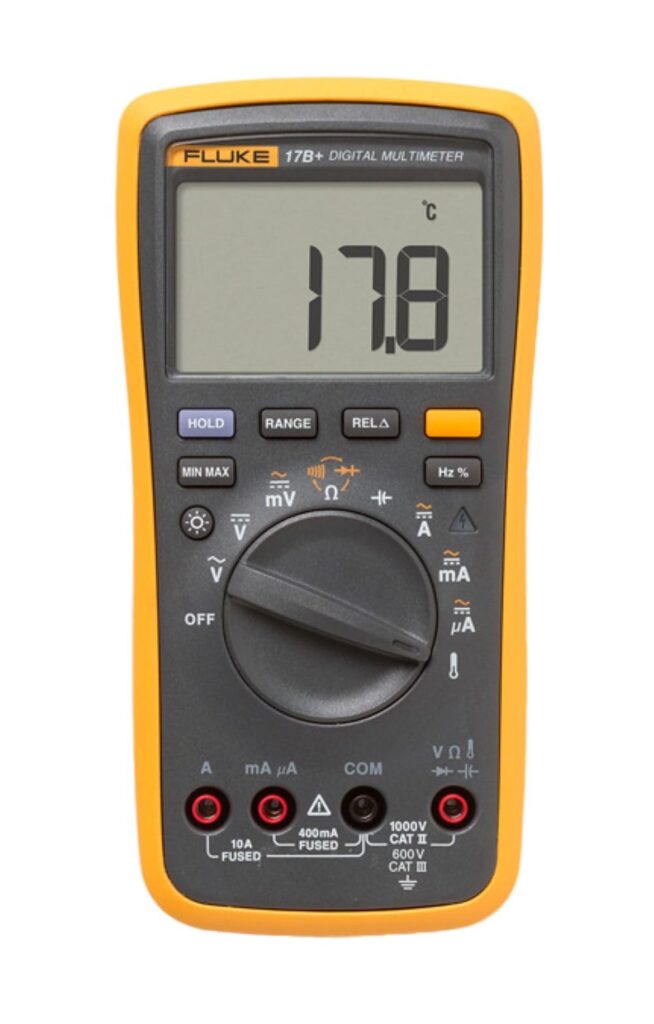
This multimeter is a strong choice for anyone needing reliability and accuracy in their electrical work.
Pros
- Built to last in harsh conditions
- Easy-to-read display and simple controls
- Measures a wide range of functions, including temperature and frequency
Cons
- Not a true RMS multimeter
- Heavier than some competing models
- It may take time to understand all the features fully
We’ve used the Fluke 17B+, and it delivers solid performance. Its rugged design makes it suitable for various environments. We appreciate how easy it is to operate, even with gloves on. The transparent display helps us read measurements without straining our eyes.
The multimeter covers many functions, such as AC/DC voltage, current measurements, resistance, and temperature. This versatility is beneficial for tackling different electrical tasks. We’ve found it particularly helpful when troubleshooting heating and cooling systems.
While it excels in many areas, it’s worth noting that this model needs to be an accurate RMS meter. If you deal with complicated systems, this may be fine for certain people, but it is something to consider. Despite being slightly heavier than other options, the durability outweighs this drawback.
Overall, the Fluke 17B+ stands out as a reliable tool for professionals and hobbyists in electrical testing.
Buying Guide
When choosing a multimeter, we should focus on a few important key features for electrical testing.
1. Measurement Types
Most multimeters can measure voltage, current, and resistance. We need to consider what measurements we will use most often.
2. Accuracy
Higher accuracy is essential for precise readings. Look for a multimeter with a clear accuracy rating, usually shown as a percentage.
3. Display
A clear and easy-to-read display is essential. We should look for a multimeter with a digital readout for better visibility.
4. Range
Check the measurement range of the multimeter. A more comprehensive range allows for more versatility in testing.
5. Safety Ratings
We must pay attention to safety ratings. Look for multimeters rated for the electrical environments we will be working in.
6. Additional Features
Some multimeters have extra features like data hold, auto power off, and backlighting, making testing more accessible.
| Feature | Importance |
| Measurement Types | Essential for tasks |
| Accuracy | Precision of readings |
| Display | Visibility of results |
| Range | Versatility in tests |
| Additional Features | Added convenience |
We can choose the best multimeter for our needs by considering these factors.
Choosing a suitable multimeter for electrical testing requires careful consideration of several vital factors. These include accuracy, durability, and features that match our testing needs.
It is essential to read reviews and compare specifications. We can use this information to find a multimeter that suits our requirements.
In our search, we’ve found that user-friendly interfaces and transparent displays make a significant difference. A good multimeter should allow us to test voltage, resistance, and current quickly.
Ultimately, the best multimeter varies based on what we need it for. We can evaluate features and price points to select the right tool for our electrical testing tasks.
Frequently Asked Questions
We know that choosing a suitable multimeter can be tricky. Below, we answer common questions about features, options for beginners, brand comparisons, and recommendations for specific tasks like automotive work and electronics repair.
What Features Should I Look For In A Multimeter For Professional Electrical Work?
For professional use, we should look for multimeters with many measurement functions. Essential features include true RMS capability for accurate readings on non-linear signals, high voltage and current ratings, and safety features like protective fuses. A backlit display and data hold function are also helpful in various lighting conditions.
What Are The Best Multimeter Options For Beginner Electricians?
For beginner electricians, we recommend user-friendly and affordable multimeters. Look for models with essential features like voltage, current, and resistance measurements. Some good options include the Klein Tools MM400 and the AstroAI Digital Multimeter, which provide solid performance without overwhelming complexity.
How Do Fluke Multimeters Compare To Other Brands For Electrical Testing?
Fluke multimeters are well-known for being accurate and dependable. They often come with advanced features and robust build quality. While they may be pricier, many professionals believe the investment is worth it compared to other brands needing more precision or durability.
What Are The Top Multimeters Recommended For Automotive Diagnostic Work?
We should focus on multimeters that offer functionalities specific to vehicle systems for automotive diagnostics. Models like the Innova 3320 and the Autel AutoLink AL319 are popular choices. They provide features such as a built-in vehicle diagnostic tool and the ability to measure engine parameters accurately.
Which Multimeters Are Known For High Accuracy In Electronics Repair?
Accuracy is crucial in electronics repair. Models like the Extech EX330 or the Agilent U1242B are known for their precision in measuring small voltages and currents. These multimeters often come with features tailored for circuit testing.
What Are Some Highly Rated Multimeter Brands Used By Electricians?
We hear good things about several electrical brand names. Fluke, Klein Tools, and Brymen have a reputation for being reliable and lasting long. Each brand offers a variety of models suited for different levels of expertise and price ranges, making them popular among electricians.

